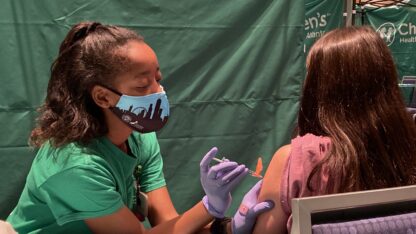The average age of death from the coronavirus is 80, the U.S. surgeon general said earlier this month.
Dr. Jerome Adams apparently was referring to the global average.
The latest statistics here in Georgia, though, show the average age of death from COVID-19 is 68.
Though there are exceptions, deaths and serious illnesses from the virus typically occur among the elderly and people with serious underlying medical conditions. People in both categories are obviously at major risk.
Among the 80 Georgians who had died of the disease as of noon Sunday, 55 had underlying health conditions, state health officials reported. For 22 others who died, it’s not known whether they had such conditions. Only three who died were reported to have had no such health conditions.
The youngest Georgian to die of COVID-19 was a 29-year-old Peach County woman. The oldest was a 95-year-old Baker County man.
It’s too early to draw conclusions from current data on Georgia’s death figures, said Dr. Harry Heiman of the School of Public Health at Georgia State University. A cluster of nursing home deaths in Georgia could push the state’s average age of fatalities higher, Heiman said Sunday.
But Georgia and other Southeastern states have disproportionately higher rates of diabetes, and heart and lung disease, Heiman noted. “We have a sicker population,’’ he said. “Our population is at higher risk.’’
When more data arrive, Heiman added, “I wouldn’t be surprised if the average age [of death] isn’t younger in Georgia’’ than in some other states.
Georgia has consistently rated low among states in measures of health status. Its percentage of uninsured people is among the highest in the nation, and many residents lack access to health care.
The CDC said that although millennials are not immune to coronavirus illness, the most severe cases, and the highest rates of death, are among the elderly. Although 17 percent of the U.S. population is 65 or older, 31 percent of U.S. cases have been in that age group, CDC experts concluded in a March report.
In other Georgia-related news on the pandemic:
President Trump has declared a major disaster for all 159 Georgia counties due to the impact of the pandemic, Gov. Brian Kemp announced Sunday.
“Georgia is grateful for this designation, as it will enable the state to continue partnering with federal agencies in a coordinated fight against this pandemic,” said Kemp in a statement. “The presidential declaration is a critical step in providing additional assistance to our state and local governments as they continue to respond to COVID-19.”
This declaration allows federal agencies to provide direct assistance to the state.
On Saturday, Kemp and the state’s Department of Community Health said they submitted a request to federal health officials for an 1135 Medicaid waiver.
If the request is granted, the federal Centers for Medicare & Medicaid Services will waive some requirements in Medicare, Medicaid and the Children’s Health Insurance Program (known as PeachCare in Georgia), giving the state’s Medicaid agency more flexibility and removing red tape that can hamper access to services.
More than 30 states have seen these applications approved by the feds.
“As we continue fighting COVID-19, these waivers will empower the health care community and increase their ability to care for patients by reducing federal regulations,” said Kemp. “From local health departments to major hospitals, health care providers in Georgia are on the front lines of this fight. I am proud to collaborate efforts across state government with the Georgia Hospital Association to let health care providers know we stand with them.”
Bill Custer, a health insurance expert at Georgia State, said a waiver could allow clinicians with out-of-state licensing to practice medicine here.
“That removes barriers to telehealth, and could allow physicians to move rapidly into the state,’’ Custer said.
Waivers on federal EMTALA rules on emergency room care could allow hospitals to transfer patients before they are medically stable, he said.
This story was originally published at Georgia Health News.










